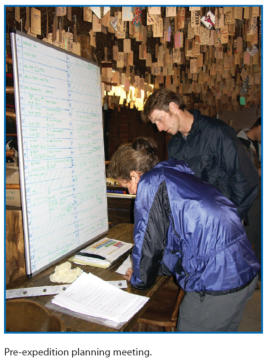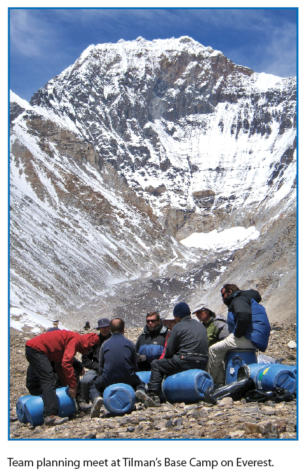Expedition success requires logistical planning
This is an excerpt from Mountaineering by Carlton Cooke,Dave Bunting,John O'Hara.
Importance of Logistics
Before it is possible to detail exactly how we accomplished our logistical plan, it is worthwhile to consider the role of logistics in enabling an expedition. Again, as mentioned, even though our expedition was a reasonably large affair set in the Himalayas, the ideas that I will discuss are applicable to all types of expeditions in all environments.
For anyone undertaking an expedition at any level, logistics should be considered at the very onset of planning. It develops hand in glove with all other aspects of expeditionary planning. Every major decision has an impact on the logistics plan. For example, stating intent to get one extra person to the top of Mount Everest, which is at the top of an exponential pyramid of logistics, is not as easy as adding one to all the requirements. It is a complex power function. Changes that seem small can have a large effect on the logistics of big expeditions. For this reason, the logistics management and the overall expedition management team work closely together. Indeed, in some expeditions, one person will fulfil both functions. We were unusual in that our expedition did not use this approach.
On a low-level expedition, good logistics will make the trip more cost effective, more efficient, and more enjoyable for the participants. At the higher end of expeditionary activity, logistics takes on a strategic importance. Good logistics becomes critical to achieving success. Cost effectiveness, efficiency, safety, and enjoyment have serious logistical consequences on such expeditions—failure to deliver in any one of these areas could lead to overall failure. Therefore, logistics comprises two components. On the one hand, it deals with real items or kit: equipment, clothing, vehicles, food, toilet paper, transport, freight, and every other physical element of an expedition and the means of delivering it. On the other hand, it deals with people. The whole point of logistics is to provide these physical items to satisfy people's needs. Logistics is about helping people to do something. Poor logistics may have a detrimental effect on the morale of participants and their ability to perform. In turn, this will have a detrimental effect on the expedition. The maintenance of morale becomes a logistical effort. To deliver these physical and personal components in an appropriately integrated function, therefore, defines the overall logistics capability that is required. The job of the logistics manager is to deliver this capability to the expedition in a coherent and effective way—to provide the conditions that allow the team to perform.

It is useful to consider some guiding principles. They act as a reminder so that effort is not wasted in fruitless areas or isolated avenues. They are the checks and balances of logistical planning. Every decision, change, or idea should be judged against these principles to ensure that the criteria of the principles are met. They also act as a reminder that at the base of every element of an expedition, there should be an efficiency of effort. For those with an extensive familiarity with logistics, these principles become second nature—often, they are simply gut feelings. For those who are still developing that level of experience, I advise continually thinking in terms of the following.
Planning Planning is the most crucial principle of expeditionary logistics. Complete plans must be made to cover all likely courses of events. Furthermore, contingency plans should be made for the most likely problems, such as excessively inclement weather. Planning effort should be given to what-if questions. What if we lose a camp through bad weather? What if a team becomes stranded at a camp for more than a couple of days? The type of expedition will determine these questions. Whatever the expedition, the most likely what-ifs need contingency plans and preparations. Finally, planning should include numerous decision points that act as balances against possible drift. This keeps the expedition streamlined, promotes momentum, and ensures good anticipation. To place the importance of this planning element in context, the total duration of our expedition was 4 years from the moment of conception to the completion of the expedition itself. By far the greatest time was spent on planning and preparation—3 years.
Expediency The word expedition derives from the Latin expeditus (unimpeded). In its English verb form, expedite, it simply means to process a task in a quick and efficient fashion. At the heart of an expedition is an ethos of expediency—fulfilling the logistics efficiently with as little fuss as possible. I used to teach ski mountaineering, and I conveyed this principle in terms of energy conservation. Even though an expedition is a different beast to a ski tour, the same ideas are applicable here. They are the five Es of energy conservation:
- Economy. This is the correct amount of effort without duplication or waste. Exactly the correct amount of resources is used to achieve the aim. It is important not to overly burden an expedition with a massive resource schedule, most of which will never be used.
- Efficiency. For big expeditions, enormous quantities of equipment and resources may be required. Additionally, the systems for deploying and managing these resources may be complex. For this reason, every resource and the way it is used must produce the maximum positive impact possible. Resources that are used infrequently, such as luxuries, will burden the expedition and make logistical management slow and unresponsive.
- Effort. There is no doubt that an expedition such as the one we undertook requires an enormous amount of effort. Four years of effort went into ours, but where this effort was made was also critical. Pushing hard at the wrong time can lead to an overly exhausted logistical effort and an exhausted team. Therefore, knowing when to push hard, when to coast, and when to relax becomes crucial in executing expedition logistics.
- Easy. Expeditions are not supposed to be easy. They often deliberately seek out the most difficult terrain in the most difficult environments. However, there is no point in making a difficult situation worse. So long as the expedition stays within the bounds of the style, ethics, route, and so on, it should aim to make each individual element within the expedition as easy as possible.
- Effective. There has to be a reason for every logistics effort, and this reason has to promote the success of the expedition or enable an objective or goal that will promote overall success. There is no point in pushing many resources at an effort that will have negligible positive impact on the expedition. Every resource and the way it is used must have an effective impact on the progression of the expedition towards its conclusion.
Simplicity In times of stress or difficult conditions, a simple logistics plan is more likely to survive than a complex one. Because expeditions seek out these very conditions, simplicity makes sense. In project management terms, this simplicity can be achieved by identifying a critical path with as few links as possible. Effort should be made to achieve this critical path.
Teamwork An expedition is a complicated project. It is impossible for one person to take responsibility for it all. Developing a good team with a good work ethic and good lines of communication is essential.
Flexibility Despite the best planning, things will not always develop in the way that they were envisaged. For this reason, a flexible approach to the management of logistical effort is required. The ability to anticipate and react to situations in an appropriate and timely fashion is essential.
These principles make it abundantly clear that it is not only impossible to produce a logistics capability that provides for every eventuality, but it is counterproductive and undesirable to even try to do so. For this reason, there is an element of risk involved with every logistical and planning decision. A balance must exist that allows logistics to be robust enough to be effective yet not so cumbersome that it becomes an uneconomical burden. Erring too far in either direction places an expedition at risk. Achieving a good balance reduces overall risk of failure. The primary responsibility of the planning and logistics team is to achieve and maintain this balance. The logistics manager must control this balance, especially when responsibility is devolved to area or function managers. It is easy to become so engrossed in one's own responsibility that one forgets the overall picture.

Learn more about Mountaineering.
More Excerpts From MountaineeringSHOP

Get the latest insights with regular newsletters, plus periodic product information and special insider offers.
JOIN NOW
Latest Posts
- How do I integrate nutrition education into PE?
- How does the support of friends and family influence physical activity?
- What makes the Physical Best approach unique?
- Strength training gimmicks . . . or not?
- How do vitamins and minerals support our bodies?
- Why do many people have difficulty losing weight?


